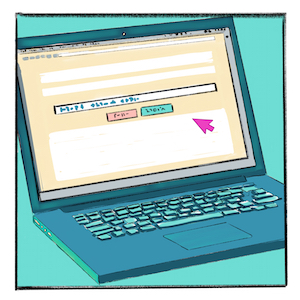In dieser Lektion
Hören
Vor dem Hören
Wie fahren Sie zur Arbeit oder in die Schule? Write a few sentences about how you commute to get to your workplace or school. How do you get there? How far is it? How long does it take to get there? Write in German, of course.
Hören
Listen to the audio file, in which first Anna and then Barbara answer the question “Wie kommen Sie von Zuhause zur Arbeit?”
Arbeit mit dem Hören
Strukturen
Two-Way Prepositions with the Accusative Case
As you now know, when two-way prepositions are used to indicate direction, they are followed by the accusative case. In other words, if you answer the question “wohin?” or “where to?” then you would typically use a two-way preposition along with accusative. Anna and Barbara, for example, both discussed how they get to work: Wie fahren Sie in die Arbeit? And you heard several other examples of a two-way preposition with accusative in the listening text.
Note that in das is often abbreviated as ins. An das or auf das can also be abbreviated: ans or aufs
in versus auf
Here are some examples of common phrases that you might hear or see that use a two-way preposition in the dative: im Restaurant, im Kino, im Theater, im Cafe, but also in der Schule gehen, im Unterricht, in der Bibliothek. Notice that the preposition in gets used to talk about locations that are buildings. However, there is an exception: auf gets used when your location is a public building. Thus we have these common phrases: auf der Bank, auf der Post, auf dem Rathaus.
Use a complete prepositional phrase to answer the following questions!
Schreiben
Was gibt es in Ihrer Nachbarschaft? Wohin gehen Sie gern oder oft?
What types of shops, services, or amenities do you have in your neighborhood? Where do you like to go? Use the following locations to write sentences using the dative (to describe location) and the accusative (to describe destination).
das Schwimmbad, die Bank, die Post, die Bäckerei, der Lebensmittelladen oder der Supermarkt, das Restaurant, der Park, die Kirche
Beispiel: Es gibt ein Theater in meiner Nachbarschaft. Ich gehe gern in das Theater.
Beispiel: Es gibt kein Theater in meiner Nachbarschaft, aber ich gehe nicht oft ins Theater.
Kultur
Mapping Activity: Wie weit ist es?
Select one of the 10 addresses below (or your teacher might assign you a specific address). Using Google Maps or something similar, locate the address. Then figure out how far it is to the grocery stores listed below. Note that there are different stores for Germany and for Austria, so you need to be sure you know which country your address is in. Finally, select three of the public buildings/services from the list below and see how far it is to those locations as well. Write up your results.
Supermarkets in Austria: Hofer, Billa, Spar, denn’s Biomarkt. Also look for a Bäckerei.
Supermarkets in Germany: Aldi, Edeka oder Netto, Lidl, Dennree (bio)/denn’s. Also look for a Bäckerei.
List of public buildings/services (select three): die Post, die Bank, die Kirche ODER die Synagoge ODER die Moschee, die Schule, der Kindergarten, das Krankenhaus, das Schwimmbad
Here are the choices of addresses for your starting point:
- Schopenhauerstraße 17, 1180 Wien
- Brandtstätte 5, 1010 Wien
- Gumppstraße 50, 6020 Innsbruck
- Bahnhofstraße 22, 6911 Lochau
- Walserstraße 27, 6991 Riezlern
- Hochgratstraße 8, 87545 Burgberg im Allgäu
- Farmsener Weg 28, 22391 Hamburg
- Wilsederstraße 2, 12169 Berlin
- Eugenstraße 18, 72072 Tübingen
- Stangestraße 7, 01324 Dresden
Wortschatz
The verb kommen
The German verb kommen literally means to come. But it means much more than that! Kommen is used in many contexts to explain how one gets around, and it is used much more widely than the English to come to discuss mobility and travel. Wie kommt man zu (+ the dative case), for example, would be the best way to ask how you get somewhere.
Wie kommt man zum Bahnhof?
How do you get to the train station?
Wir kommen morgen zu dir.
We’re going to visit you tomorrow.
Note that in the listening for this Erweiterung you heard this question: “Wie kommen Sie von Zuhause in die Arbeit?” In English we would probably ask, “how do you get to work from home?”
Nouns
der Bach, -¨e
der Bäcker, – (oder die Bäckerei, -en)
die Bank, -en (oder die Sparkasse, -n)
der Berg, -e
das Dorf, -¨er
das Gebäude, –
das Geschäft, -e
der Kindergarten, -¨
die Kirche, -n
das Krankenhaus, -¨er
die Kreuzung, -en
der Lebensmittelladen, -¨
die Metzgerei, -n
die Nachbarschaft, -en
der Park, -s
die Post (no plural)
das Restaurant, -s
die Schule, -n
das Schwimmbad, -¨er
der Supermarkt, -¨e
die Stadt, -¨e (Stadtrand, Stadtmitte, Stadtzentrum)
das Theater, –
der Zoo, -s (oder der Tiergarten oder der Tierpark)
Verbs
fahren
gehen
kommen
laufen
wandern
Adjectives and Adverbs
links
rechts
zentral
Other Useful Words and Phrases
in der Nähe
um die Ecke
Wie kommt man zu….

